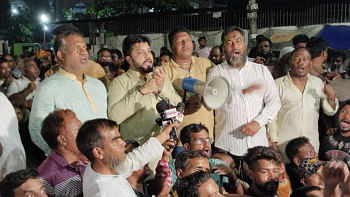Pak textbooks still see '71 war as conspiracy
Nearly four decades after the 1971 war, Pakistani school textbooks continue to focus on conspiracy theories involving India, Russia and the US regarding the creation of Bangladesh while glossing over the Pakistan Army's atrocities in the erstwhile East Pakistan.
While the findings of Pakistan's Hamood-ur-Rehman Commission on the 1971 Indo-Pak war were never made public, students at the Metric and Intermediate levels of school (Classes nine to 12) "are being taught conspiracy theories and a factually incorrect version of history", according to an article on the website of the Dawn newspaper.
The Pakistan Studies textbook for classes nine and 10 fail to mention the role of late premier Zulfiqar Ali Bhutto or the Pakistan People's Party in its section on the 1971 war and lists the "role of Hindu teachers" and "international conspiracies" among the reasons for the "fall of East Pakistan".
"A large number of Hindu teachers were teaching in the educational institutions in East Pakistan. They produced such literature which created negative thinking in the minds of Bangalees against the people of West Pakistan," the textbook states.
The section on "international conspiracies" states, "About 10 million Hindus were living in East Pakistan. India stood at the back of these Hindus to protect their interests. India wanted to separate East Pakistan to strengthen the economic position of the Hindus.
"Many Hindus acted as spies for India. Russia was against Pakistan because Pakistan had allowed America to establish military bases in Pakistan.
"On the other hand, America also wanted separation of East Pakistan. Under the circumstances Russia openly supported India's aggression against Pakistan."
The article noted that Pakistani historians and academics "have long decried the white-washing of the state curriculum" and it was "appalling" that the government is "yet to make changes in the syllabi being taught to Pakistan's future generation".
While the Pakistan Studies textbooks for classes 10 and 11 mention the role of the Mukti Bahani and India's support for the group, they are an "incorrect version of the story behind the creation of Bangladesh", the report said.
Both textbooks make no mention "of the documented atrocities committed by the Pakistan Army - which includes rapes, targeted killings - against the Mukti Bahini and the genocide of the Bangalee population".
The textbooks fail to mention the number of civilian deaths in East Pakistan in the period leading up to the creation of Bangladesh.
Nor do they "mention Zulfiqar Ali Bhutto's inflexible stand on sharing power with Sheikh Mujibur Rahman's Awami League", the report said.
Abbas Hussain, director of the Teachers Development Centre, described this version of history "a farce".
"We give our children hocus pocus in textbooks."
Asked how teachers feel about teaching students such material, Hussain replied, "Most teachers have classroom schizophrenia, where the children and teachers are in a sort of conspiracy that there is a real world outside the classroom and there is a fictitious world in the classroom and you jolly well obey that!"
Noted academic Pervez Hoodbhoy said, "Forty years later, Bangladesh has many disputes with India but it shows not the slightest inclination to reintegrate with Pakistan.
"If Pakistan's school books actually taught honest history, they would be explaining why East Pakistanis felt exploited and fought for their independence. Instead, our children are taught cock-and-bull conspiracy nonsense."

 For all latest news, follow The Daily Star's Google News channel.
For all latest news, follow The Daily Star's Google News channel. 



Comments